英国文学史 十八世纪 古典主义,感伤主义
- 格式:ppt
- 大小:2.34 MB
- 文档页数:128
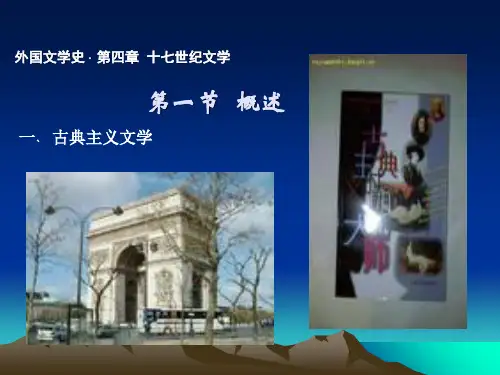
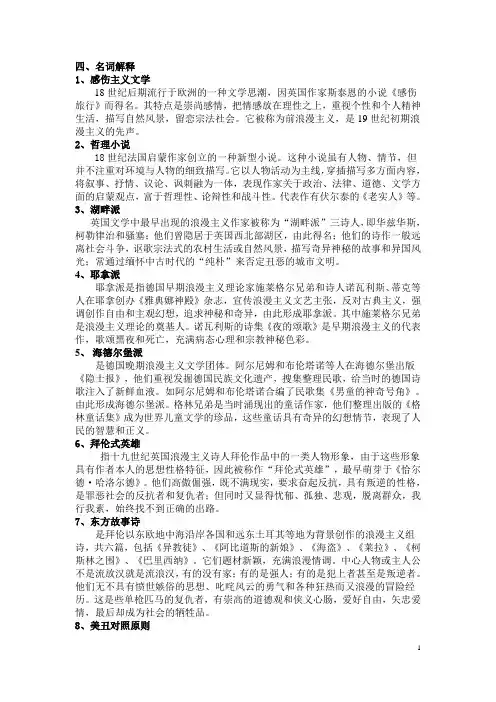
四、名词解释1、感伤主义文学18世纪后期流行于欧洲的一种文学思潮,因英国作家斯泰恩的小说《感伤旅行》而得名。
其特点是崇尚感情,把情感放在理性之上,重视个性和个人精神生活,描写自然风景,留恋宗法社会。
它被称为前浪漫主义,是19世纪初期浪漫主义的先声。
2、哲理小说18世纪法国启蒙作家创立的一种新型小说。
这种小说虽有人物、情节,但并不注重对环境与人物的细致描写。
它以人物活动为主线,穿插描写多方面内容,将叙事、抒情、议论、讽刺融为一体,表现作家关于政治、法律、道德、文学方面的启蒙观点,富于哲理性、论辩性和战斗性。
代表作有伏尔泰的《老实人》等。
3、湖畔派英国文学中最早出现的浪漫主义作家被称为“湖畔派”三诗人,即华兹华斯,柯勒律治和骚塞;他们曾隐居于英国西北部湖区,由此得名;他们的诗作一般远离社会斗争,讴歌宗法式的农村生活或自然风景,描写奇异神秘的故事和异国风光;常通过缅怀中古时代的“纯朴”来否定丑恶的城市文明。
4、耶拿派耶拿派是指德国早期浪漫主义理论家施莱格尔兄弟和诗人诺瓦利斯、蒂克等人在耶拿创办《雅典娜神殿》杂志,宣传浪漫主义文艺主张,反对古典主义,强调创作自由和主观幻想,追求神秘和奇异,由此形成耶拿派。
其中施莱格尔兄弟是浪漫主义理论的奠基人。
诺瓦利斯的诗集《夜的颂歌》是早期浪漫主义的代表作,歌颂黑夜和死亡,充满病态心理和宗教神秘色彩。
5、海德尔堡派是德国晚期浪漫主义文学团体。
阿尔尼姆和布伦塔诺等人在海德尔堡出版《隐士报》,他们重视发掘德国民族文化遗产,搜集整理民歌,给当时的德国诗歌注入了新鲜血液。
如阿尔尼姆和布伦塔诺合编了民歌集《男童的神奇号角》。
由此形成海德尔堡派。
格林兄弟是当时涌现出的童话作家,他们整理出版的《格林童话集》成为世界儿童文学的珍品,这些童话具有奇异的幻想情节,表现了人民的智慧和正义。
6、拜伦式英雄指十九世纪英国浪漫主义诗人拜伦作品中的一类人物形象,由于这些形象具有作者本人的思想性格特征,因此被称作“拜伦式英雄”,最早萌芽于《恰尔德·哈洛尔德》。
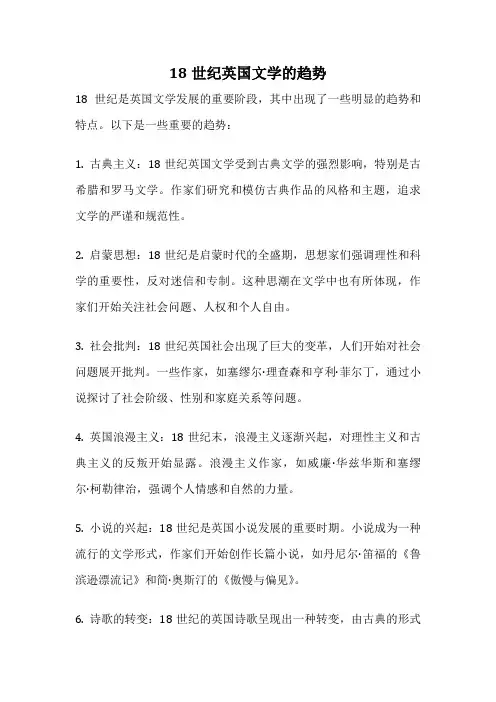
18世纪英国文学的趋势
18世纪是英国文学发展的重要阶段,其中出现了一些明显的趋势和特点。
以下是一些重要的趋势:
1. 古典主义:18世纪英国文学受到古典文学的强烈影响,特别是古希腊和罗马文学。
作家们研究和模仿古典作品的风格和主题,追求文学的严谨和规范性。
2. 启蒙思想:18世纪是启蒙时代的全盛期,思想家们强调理性和科学的重要性,反对迷信和专制。
这种思潮在文学中也有所体现,作家们开始关注社会问题、人权和个人自由。
3. 社会批判:18世纪英国社会出现了巨大的变革,人们开始对社会问题展开批判。
一些作家,如塞缪尔·理查森和亨利·菲尔丁,通过小说探讨了社会阶级、性别和家庭关系等问题。
4. 英国浪漫主义:18世纪末,浪漫主义逐渐兴起,对理性主义和古典主义的反叛开始显露。
浪漫主义作家,如威廉·华兹华斯和塞缪尔·柯勒律治,强调个人情感和自然的力量。
5. 小说的兴起:18世纪是英国小说发展的重要时期。
小说成为一种流行的文学形式,作家们开始创作长篇小说,如丹尼尔·笛福的《鲁滨逊漂流记》和简·奥斯汀的《傲慢与偏见》。
6. 诗歌的转变:18世纪的英国诗歌呈现出一种转变,由古典的形式
和主题向更加个人化和自由的方向发展。
诗人们开始关注个人情感和自然景观,并采用更加自由的诗体,如威廉·布莱克的无韵诗。
总的来说,18世纪英国文学在古典主义和启蒙思想的影响下,开始关注社会问题和个人情感,同时也为后来浪漫主义和小说的兴起铺平了道路。
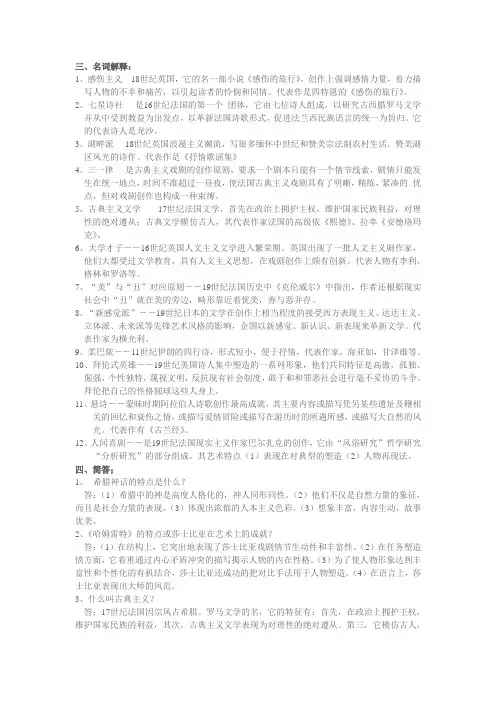
三、名词解释:1、感伤主义---18世纪英国,它的名一部小说《感伤的旅行》,创作上强调感情力量,着力描写人物的不幸和痛苦,以引起读者的怜悯和同情。
代表作是四特恩的《感伤的旅行》。
2、七星诗社----是16世纪法国的第一个团体,它由七位诗人组成,以研究古西腊罗马文学并从中受到教益为出发点,以革新法国诗歌形式,促进法兰西民族语言的统一为旨归。
它的代表诗人是龙沙。
3、湖畔派----18世纪英国浪漫主义潮流,写很多缅怀中世纪和赞美宗法制农村生活,赞美湖区风光的诗作。
代表作是《抒情歌谣集》4、三一律----是古典主义戏剧的创作原则,要求一个剧本只能有一个情节线索,剧情只能发生在统一地点,时间不准超过一昼夜,使法国古典主义戏剧具有了明晰,精练,紧凑的优点,但对戏剧创作也构成一种束缚。
5、古典主义文学------17世纪法国文学,首先在政治上拥护主权,维护国家民族利益,对理性的绝对遵从;古典文学模仿古人,其代表作家法国的高级依《熙德》、拉率《安德珞玛克》。
6、大学才子――16世纪英国人文主义文学进入繁荣期。
英国出现了一批人文主义剧作家,他们大都受过文学教育,具有人文主义思想,在戏剧创作上颇有创新。
代表人物有李利、格林和罗洛等。
7、“美”与“丑”对应原则――19世纪法国历史中《克伦威尔》中指出,作者还根据现实社会中“丑”就在美的旁边,畸形靠近着优美,善与恶并存。
8、“新感觉派”――19世纪日本的文学在创作上相当程度的接受西方表现主义、达达主义、立体派、未来派等先锋艺术风格的影响,企图以新感觉、新认识、新表现来革新文学。
代表作家为横光利。
9、柔巴依――11世纪伊朗的四行诗,形式短小,便于抒情,代表作家,海亚如,甘泽维等。
10、拜伦式英雄――19世纪英国诗人集中塑造的一系列形象,他们共同特征是高傲,孤独、倔强,个性独特,蔑视文明,反抗现有社会制度,敢于和和罪恶社会进行毫不妥协的斗争。
拜伦把自己的性格圆球这些人身上。
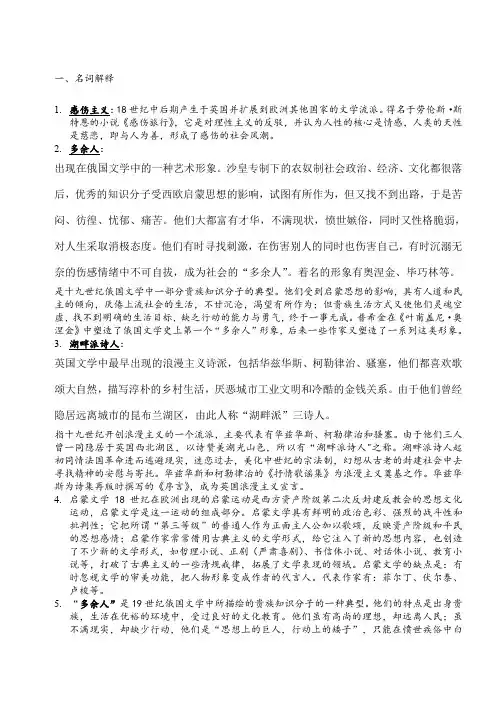
一、名词解释1.感伤主义:18世纪中后期产生于英国并扩展到欧洲其他国家的文学流派。
得名于劳伦斯·斯特恩的小说《感伤旅行》,它是对理性主义的反驳,并认为人性的核心是情感,人类的天性是慈悲,即与人为善,形成了感伤的社会风潮。
2.多余人:出现在俄国文学中的一种艺术形象。
沙皇专制下的农奴制社会政治、经济、文化都很落后,优秀的知识分子受西欧启蒙思想的影响,试图有所作为,但又找不到出路,于是苦闷、彷徨、忧郁、痛苦。
他们大都富有才华,不满现状,愤世嫉俗,同时又性格脆弱,对人生采取消极态度。
他们有时寻找刺激,在伤害别人的同时也伤害自己,有时沉溺无奈的伤感情绪中不可自拔,成为社会的“多余人”。
着名的形象有奥涅金、毕巧林等。
是十九世纪俄国文学中一部分贵族知识分子的典型。
他们受到启蒙思想的影响,具有人道和民主的倾向,厌倦上流社会的生活,不甘沉沦,渴望有所作为;但贵族生活方式又使他们灵魂空虚,找不到明确的生活目标,缺乏行动的能力与勇气,终于一事无成。
普希金在《叶甫盖尼·奥“多余人”形象,后来一些作家又塑造了一系列这类形象。
3.英国文学中最早出现的浪漫主义诗派,包括华兹华斯、柯勒律治、骚塞,他们都喜欢歌颂大自然,描写淳朴的乡村生活,厌恶城市工业文明和冷酷的金钱关系。
由于他们曾经隐居远离城市的昆布兰湖区,由此人称“湖畔派”三诗人。
指十九世纪开创浪漫主义的一个流派,主要代表有华兹华斯、柯勒律治和骚塞。
由于他们三人曾一同隐居于英国西北湖区,以诗赞美湖光山色,所以有“湖畔派诗人"之称。
湖畔派诗人起初同情法国革命进而逃避现实,迷恋过去,美化中世纪的宗法制,幻想从古老的封建社会中去寻找精神的安慰与寄托。
华兹华斯和柯勒律治的《抒情歌谣集》为浪漫主义奠基之作。
华兹华斯为诗集再版时撰写的《序言》,成为英国浪漫主义宣言。
4.启蒙文学 18世纪在欧洲出现的启蒙运动是西方资产阶级第二次反封建反教会的思想文化运动,启蒙文学是这一运动的组成部分。
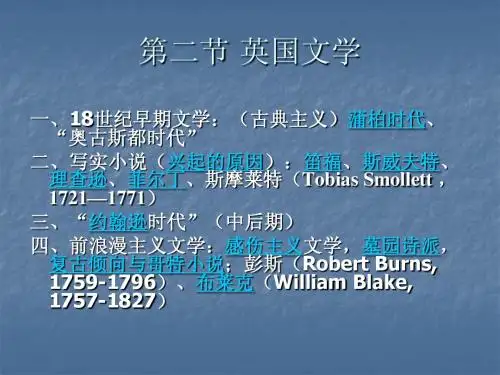
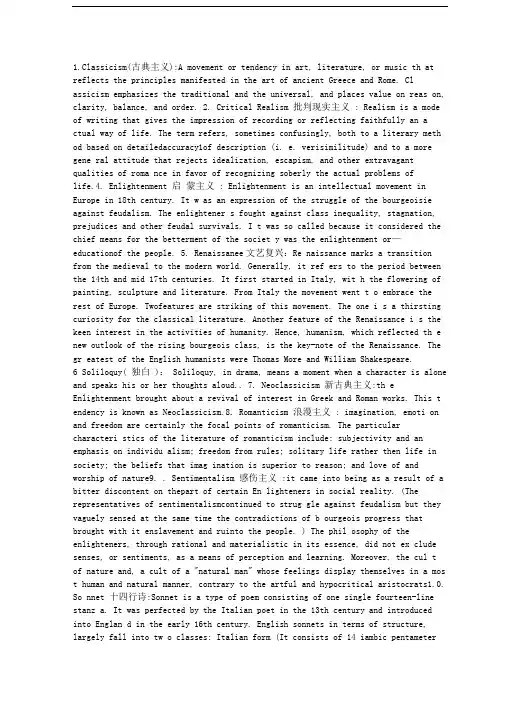
1.Classicism(古典主义):A movement or tendency in art, literature, or music th at reflects the principles manifested in the art of ancient Greece and Rome. Cl assicism emphasizes the traditional and the universal, and places value on reas on, clarity, balance, and order.2. Critical Realism 批判现实主义: Realism is a mode of writing that gives the impression of recording or reflecting faithfully an a ctual way of life. The term refers, sometimes confusingly, both to a literary meth od based on detailedaccuracy1of description (i. e. verisimilitude) and to a more gene ral attitude that rejects idealization, escapism, and other extravagant qualities of roma nce in favor of recognizing soberly the actual problems oflife.4. Enlightenment 启蒙主义: Enlightenment is an intellectual movement in Europe in 18th century. It w as an expression of the struggle of the bourgeoisie against feudalism. The enlightener s fought against class inequality, stagnation, prejudices and other feudal survivals. I t was so called because it considered the chief means for the betterment of the societ y was the enlightenment or—educationof the people. 5. Renaissanee文艺复兴:Re naissance marks a transition from the medieval to the modern world. Generally, it ref ers to the period between the 14th and mid 17th centuries. It first started in Italy, wit h the flowering of painting, sculpture and literature. From Italy the movement went t o embrace the rest of Europe. Twofeatures are striking of this movement. The one i s a thirsting curiosity for the classical literature. Another feature of the Renaissance i s the keen interest in the activities of humanity. Hence, humanism, which reflected th e new outlook of the rising bourgeois class, is the key-note of the Renaissance. The gr eatest of the English humanists were Thomas More and William Shakespeare.6 Soliloquy( 独白): Soliloquy, in drama, means a moment when a character is alone and speaks his or her thoughts aloud.. 7. Neoclassicism 新古典主义:th e Enlightenment brought about a revival of interest in Greek and Roman works. This t endency is known as Neoclassicism.8. Romanticism 浪漫主义: imagination, emoti on and freedom are certainly the focal points of romanticism. The particularcharacteri stics of the literature of romanticism include: subjectivity and an emphasis on individu alism; freedom from rules; solitary life rather then life in society; the beliefs that imag ination is superior to reason; and love of and worship of nature9. . Sentimentalism 感伤主义:it came into being as a result of a bitter discontent on thepart of certain En lighteners in social reality. (The representatives of sentimentalismcontinued to strug gle against feudalism but they vaguely sensed at the same time the contradictions of b ourgeois progress that brought with it enslavement and ruinto the people. ) The phil osophy of the enlighteners, through rational and materialistic in its essence, did not ex clude senses, or sentiments, as a means of perception and learning. Moreover, the cul tof nature and, a cult of a "natural man" whose feelings display themselves in a mos t human and natural manner, contrary to the artful and hypocritical aristocrats1.0. So nnet 十四行诗:Sonnet is a type of poem consisting of one single fourteen-line stanz a. It was perfected by the Italian poet in the 13th century and introduced into Englan d in the early 16th century. English sonnets in terms of structure, largely fall into tw o classes: Italian form (It consists of 14 iambic pentameterlines: the first 8 lines for m the octet, which rhymes, the remaining 6 lines) and the Shakespearian (or English f orm) form. The former divides its 14 lines of iambic pentameters into two parts: one o ctet--- abbaabba and the other sestet--cdecde; while the latter consists of three quatrai ns (abab cdcd efef) and afinal coupl(et gg). The three quatrains develop thepoem's s ubject consistently and the couplet condenses the emotion into an epigram. Shakespea re and Milton are very good at sonnet1.1.Heroic couplet (英雄双韵体) A heroic coup let is a traditional form for English poetry, commonly used for epic and narrative poet ry; it refers to poems constructed from a sequence of rhyming pairs of iambic pentame ter lines. Traditional form for English poetry, commonly used for epic andnarrative p oetry, a sequence of rhyming paris of iambic pentamete1r.1. Metaphysical poetry 玄学派: Metaphysical poetry is a kind of realistic, oftenironic and witty, verse combi ning intellectual ingenuity and psychological insight written partly in reaction to the c onventions of Elizabethan love poetry by such seventeenth-century poets as John Don ne, George Herbert, Richard Crashaw, ThomasTraherne, and Andrew Marvell. One o f its hallmarks is the metaphysical conceit, a particularly arresting and ingenious typ e of metaphor. The features of the school: philosophical poems, complex rhythms an d strange images.12. The Victorian period(维多禾U亚时期)In this period, the novel became the most widely read and the most vital and challenging express ion of progressive thought. While sticking to the principle of faithful representa tion of realist novel, novelistsin this period carried their duty forward to critic ism of the society and the defense of the mass. They were all concerned abou t the fate of the common people. They were angry with the inhuman social in stitutions, the decaying social morality, and the widespread misery, poverty andinjustice.3>Their truthful picture of people 'lisfe and bitter and strongcriticis m of the society had done much in awakening the public consciousnessto the social problems and in the actualim provement of the society.4> Charles Dick ens is the leading figure of the Victorian period. 13. University Wits(大学才子) :refer to a group of scholars during the Elizabethan Age who graduated fr om either oxford or Cambridge. They came to London with the ambition to be come professional writers. Some of them later became famous poets and playw rights.They were called ”niversity Wits ”4. Gothic novel(哥特式小说):Gothi c novel, a type of romantic fiction that predominated in the late eighteenth century, w as one phase of the Romantic movement. It is futile to struggle against one's fate. Th e mysterious element plays an enormous rolein the Gothic novel; it is so replete wit h bloodcurdling scenes and unnatural feelings that it is justly called "a novel of ho rror". Its principal elements are violence, horror, and the supernatura1l.5. Historical novel(历史小说):A novel in which the action takes place during a specitic hi storical well before the time of writing. And in which some attempt to make t o depict accuratlly the customs and mentality of the period. The central charac ter---real or imagined--- is usually subject to divided loyalties within a larger h istoric conflict of which readers know the outcome, the pioneers of this genre were walter scott and cooper. 16.Dramatic monologue (戏居U独白)is a typeof poe m writing style in which a character, at some specific and critical moment, addresse s an identifiable but silent audience, thereby unintentionallyrevealing his or her essen tial temperament and personality.3. ChaucerHis career can be divided into several periods:The Canterbury tales <坎特伯雷故事集>He got his stories from various sources, Greek authors, Roman authors, Italian, Frenc h, but there is no doubt about Chaucer's originality. He retells the stories in his own w ay. The stories are told by a group of people on their way to and back from Canterbur y. Pilgrims tell stories to pass the time. Thejourney is used as a kind of device to unit e the various tales。

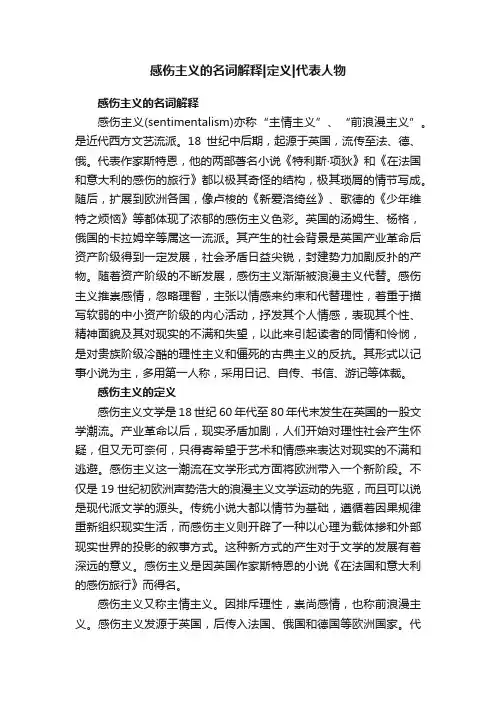
感伤主义的名词解释|定义|代表人物感伤主义的名词解释感伤主义(sentimentalism)亦称“主情主义”、“前浪漫主义”。
是近代西方文艺流派。
18世纪中后期,起源于英国,流传至法、德、俄。
代表作家斯特恩,他的两部著名小说《特利斯·项狄》和《在法国和意大利的感伤的旅行》都以极其奇怪的结构,极其琐屑的情节写成。
随后,扩展到欧洲各国,像卢梭的《新爱洛绮丝》、歌德的《少年维特之烦恼》等都体现了浓郁的感伤主义色彩。
英国的汤姆生、杨格,俄国的卡拉姆辛等属这一流派。
其产生的社会背景是英国产业革命后资产阶级得到一定发展,社会矛盾日益尖锐,封建势力加剧反扑的产物。
随着资产阶级的不断发展,感伤主义渐渐被浪漫主义代替。
感伤主义推崇感情,忽略理智,主张以情感来约束和代替理性,着重于描写软弱的中小资产阶级的内心活动,抒发其个人情感,表现其个性、精神面貌及其对现实的不满和失望,以此来引起读者的同情和怜悯,是对贵族阶级冷酷的理性主义和僵死的古典主义的反抗。
其形式以记事小说为主,多用第一人称,采用日记、自传、书信、游记等体裁。
感伤主义的定义感伤主义文学是18世纪60年代至80年代末发生在英国的一股文学潮流。
产业革命以后,现实矛盾加剧,人们开始对理性社会产生怀疑,但又无可奈何,只得寄希望于艺术和情感来表达对现实的不满和逃避。
感伤主义这一潮流在文学形式方面将欧洲带入一个新阶段。
不仅是19世纪初欧洲声势浩大的浪漫主义文学运动的先驱,而且可以说是现代派文学的源头。
传统小说大都以情节为基础,遵循着因果规律重新组织现实生活,而感伤主义则开辟了一种以心理为载体掺和外部现实世界的投影的叙事方式。
这种新方式的产生对于文学的发展有着深远的意义。
感伤主义是因英国作家斯特恩的小说《在法国和意大利的感伤旅行》而得名。
感伤主义又称主情主义。
因排斥理性,崇尚感情,也称前浪漫主义。
感伤主义发源于英国,后传入法国、俄国和德国等欧洲国家。
代表人物有英国的斯特恩、哥尔斯密斯、葛雷,法国的卢梭、伏尔泰,俄国的卡拉姆津,德国的里希特、海涅等。

英国文学史知识点 Revised by BETTY on December 25,2020一、The Anglo-Saxon period (449-1066)1、这个时期的文学作品分类: pagan(异教徒) Christian(基督徒)2、代表作: The Song of Beowulf 《贝奥武甫》 ( national epic 民族史诗 ) 采用了隐喻手法3、Alliteration 押头韵(写作手法)例子: of man was the mildest and most beloved,To his kin the kindest, keenest for praise.二、The Anglo-Norman period (1066-1350)Canto 诗章1、romance 传奇文学2、代表作: Sir Gawain and the Green Knight (高文爵士和绿衣骑士) 是一首押头韵的长诗三、Geoffrey Chaucer (1340-1400) 杰弗里.乔叟时期1、the father of English poetry 英国诗歌之父2、heroic couplet 英雄双韵体:a verse unit consisting of two rhymed(押韵) lines in iambic pentameter(五步抑扬格)3、代表作:the Canterbury Tales 坎特伯雷的故事 (英国文学史的开端)大致内容:the pilgrims arepeople from various parts of England, representatives of various walks of life and social groups.朝圣者都是来自英国的各地的人,代表着社会的各个不同阶层和社会团体小说特点:each of the narrators tells his tale in a peculiar manner, thus revealing his own views and character.这些叙述者以自己特色的方式讲述自己的故事,无形中表明了各自的观点,展示了各自的性格。
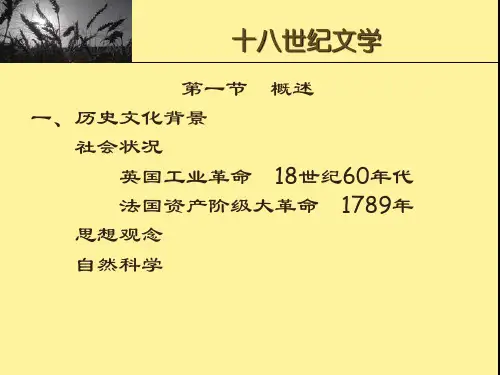
十八世纪英国文学的分类十八世纪英国文学是英国文学史上的一个重要时期,其文学作品涵盖了多种流派和类型。
本文将根据主要的文学类型,对十八世纪英国文学进行分类介绍。
一、诗歌在十八世纪,诗歌是英国文学中最具影响力的一个流派。
十八世纪的英国诗歌受到了古典主义和启蒙运动的影响,其中最著名的诗人包括亚历山大·波普、约翰·凯茵斯、托马斯·格雷和威廉·考珀。
亚历山大·波普的《风景》是英国诗歌史上的经典之作,以其清新的风格和对自然的深情描绘而著名。
约翰·凯茵斯的《赞美诗》则是一部具有宗教色彩的诗集,对于十八世纪英国的文化和社会背景有着深刻的反映。
托马斯·格雷的《埋葬于乡村教堂之墓》则以其优美的语言和深刻的哲理感染了无数读者。
而威廉·考珀则以其在诗歌中表达个人感受和情感的风格而著称。
二、小说十八世纪英国的小说是英国文学中最富有创新性和影响力的一个流派。
在这一时期,小说成为一种重要的文学形式,代表作品包括丹尼尔·笛福的《鲁滨逊漂流记》、塞繆爾·理查森的《慕尼黑夫人的情书》和简·奥斯汀的《傲慢与偏见》等。
丹尼尔·笛福的《鲁滨逊漂流记》是一部关于一个男人在荒岛上生存的冒险故事,以其生动的描写和深刻的思考而著称。
塞繆爾·理查森的《慕尼黑夫人的情书》则是一部以书信形式展现的爱情小说,对于十八世纪的女性地位和爱情观念有着深刻的反思。
简·奥斯汀的《傲慢与偏见》则是一部关于婚姻和社会阶层的小说,以其深入的人物描写和细腻的情感表达而著称。
三、戏剧十八世纪英国的戏剧在当时也很受欢迎,代表作品包括奥利弗·戈德史密斯的《船长的女儿》和理查德·布里斯托的《谎言的代价》等。
奥利弗·戈德史密斯的《船长的女儿》是一部关于爱情和冒险的戏剧,以其轻松幽默的风格和生动的情节而著称。
理查德·布里斯托的《谎言的代价》则是一部关于诚实和道德的戏剧,对于十八世纪英国社会的道德观念有着深刻的反思。
英国⽂学简史4新古典主义(18世纪)六、The Neoclassical Period (18th century)Definitions of literary terms1) The Enlightenment MovementThe 18th-century England is known as the Age of Enlightenment or the Age of Reason.The Enlightenment Movement was a progressive intellectual movement which flourished in France & swept through the whole Western Europe at the time. The movement wasa furtherance of the Renaissance of the 15th & 16th centuries. Its purpose was to enlighten the whole world with the light of modemphilosophical & artistic ideas. The enlighteners celebrated reason or rationality, equality & science. They called for a reference to order, reason & rules & advocated universal education. Famous among the great enlighteners in England were those great writers like John Dryden, Alexander pope & so on.2) NeoclassicismIn England, neoclassicism is initiated by John Dryden, culminated in Alexander Pope and continued by Samuel Johnson. It was a reaction against the fire of passions that blazed in the later Renaissance. It found its literary artistic model in the classical literature of ancient Greek and Latin authors, such as Homer, Virgil, Horace. The neoclassicists have their artistic ideas: order, logic, symmetry, restraint, accuracy, good taste, good sense, decorum and so on. In drama, they follow the Three Unities closely.1Richard Steele(1672-1729) and Joseph Addison(1672-1719)The Tatler ; The Spectator (the earliest periodicals)2Samuel Johnson(1709-1784)Samuel Johnson, commonly called Dr. Johnson, was one of the greatest figures of 18th-century English literature. He was the last great neoclassicist enlightener in the late 18th century. He had a hand in all the different branches of literary activities. He was a poet, dramatist, prose romancer, biographer, essayist, critic, lexicographer & publicist.His major works :poems: "London", & "The vanity of Human Wishes"a romance: The History of Rasselas, Prince of Abyssinia ;a tragedy: Irenehundreds of essays in the two periodicals :The Rambler & The Idler;English dictionary :A Dictionary of the English Language英国传记⽂学双星:Life of Johnson by James BoswellThe Life of Charlotte Bronte by Elizabeth Cleghon Gaskell3Alexander pope(1688-1744)poetPope is one of the fore-most satirists in world literature as well as a great poet. Pope's mock-heroic poem The Rape of the Lock is one of the finest examples of English comic verse. As a representative of the Enlightenment, Pope was one of the first to introduce rationalism to England. He was the greatest poet of his time.His major works1). The Rape of the LockA delightful burlesque of epic poetry, it ridicules the manners of the English nobility. The poem isbased on an actual incident in which a young nobleman stole a lock of a lady's hair.2) An Essay on CriticismHis first important work, An Essay on Criticism was a long didactic poem in heroic couplets. In this work, he reflected the neo-classical spirit of the times by advocating good taste, common sense & the adherence to classical rules in writing & criticism. The whole poem is written in a plain style, hardly containing any imagery or eloquence &therefore makes easy reading.3)The DunciadGenerally considered Pope's best satiric work, The Dunciad goes deep in meaning & works at many levels. Its satire is directed at Dullness in general, & in the course of it all the literary men of the age. Poets mainly who had made Pope's enemies, are held up to ridicule. But the poem is not confined to personal attack. Dullness as reflected in the corruptness of government, social morals, education & even religion, is expertly exposed & satirized.The Realistic Novel:The mid-century was, however, predominated by a newly rising literary form, the modern English novel, which, contrary to the traditional romance of aristocrats, gives a realistic presentation of life of the common English people. This-the most significant phenomenon in the history of the development of English literature in the eighteenth century - is a natural product of the Industrial Revolution & a symbol of the growing importance & strength of the English of the growing importance & strength of the English middle class, Among the pioneers were Daniel Defoe ,Samuel Richardson, Henry Fielding, Laurence Sterne, Tobias George Smollett, & Oliver Goldsmith.1Daniel Defoe(1660-1731)He acquired a pure naked English—smooth, easy, almost colloquial. Yet never coarse. He loved short, crisp, plain sentences. There is nothing artificial in his language; it is really common English.作品:1)Pamphlet: The Trueborn Englishman—A Satire.(It contained a caustic exposure of the aristocracy and the tyranny of the church.)2)Novels:Robinson Crusoe(The character of Robinson Crusoe is representative of the English bourgeoisie atthe earlier stage of its development.); Captain Singleton; Moll Flanders; Colonel Jacque2Jonathan Swift (1667-1745)He is an Irish. Swift is one of the greatest masters of English prose. His language is simple, clear and vigorous. He said,“Proper words in proper places, makes the true definition of a style.” Swift is a master of satirist, and his irony is deadly. But his satire is masked by an outward gravity, and an apparent calmness conceals his bitter irony. This makes his satire all the more powerful, as shown in his Modest Proposal.作品:1)Two stories: A Tale of a Tub; The Battle of the Books(The two stories made him well-known as a satirist.)2) Novel:Gulliver’s Travels3) Pamphlets :The Drapier’s Letters; A Modest Proposal(Swift’s pamphlets in Ireland form a veryimportant part of his works.)3Samuel Richardson(1689-1761)His main achievement as a novelist lies in his technique to show characters as personalities. Psychological analysis.作品:Pamela (The story is a told in a series of letters from the heroine, Pamela Andrews.书信体⼩说);Clarissa; Sir Charles Grandison.Pamela was a new thing in three ways:Firstly, it discarded the “improbable and marvellous”accomplishment of the former heroic romances, and pictured the life and love of ordinary people.Secondly, its intension was to afford not merely entertainment but also moral instruction.Thirdly, it described not only the sayings and doings of the characters but also their secret thoughts and feelings. It was, in fact, the first English psycho-analytical novel.4Henry Fielding(1707-1754)1)简介:As a novelist, Fielding is very great. He is the founder of the English realistic novel and sets up the theory of realism in literary.“Nature herself,” i.e., the exact observation and study of real life, was the basis of Fielding’s work. Byron, in a famous phrase, called Fielding “the prose Homer of Human Nature”. Fielding established once for all the form of the modern novel. His importance in thehistory of the novel is unique. He has been rightly call the “father of the English novel”.2)作品:Novels:①Joseph Andrews ②Jonathan Wild ③Tom Jones(流浪汉⼩说) ④AmeliaPicaresque Novel(流浪汉⼩说)is a popular sub-genre of prose fiction, which is usually satirical and depict in realistic and humorous details the adventures of a roguish hero of low social class, who lives by his or her wits in a corrupt society. The characteristic of it is loosely linked episodes, intrigue fights and adventures. The style of this novel originated in Spain and flourished in Europe in the 17th and 18th centuries, and continued to influence modern literature. In England, Tobias Smollett’s works, Daniel Defoe’s “Moll Flanders”, Fielding’s “Tom Jones”, and Charles Dickens’“Pickwick Papers” are considered to be picaresque novels. In modern America, Sawl Bellow’s “Adventure of Augie March”, Jack Kerouac’s “Dharma Bums” can be called picaresque novels. The Chinese “Journey to the Wrest” is considered to has considerable elements of picaresque.3)Some Features of Fielding’s Novels①Fielding’s method of Relating a Story: told directly by the author.②Satire in Fielding’s Novels. Satire sounds everywhere in Fielding’s works.③Fielding believed in the educational function of the novel.④Style. Fielding is a master of style. His style is easy, unlaboured and familiar, but extremely vivid and vigorous.5Tobias Smollett(1721-1771)He is a Scottish. He belonged to the realistic school.作品:Roderick Random, Peregrine Pickle, Humphry Clinker, History of England.6Laurence Sterne(1713-1768)He is a novelist of the sentimentalist school. He was born in Ireland.作品:Tristram Shandy, A Sentimental Journey.The drama of the 18th century was extensive, but very little of it has permanent or acting value. Only two men, Goldsmith and Sheridan, produced works which are of high literary quality and which are still remain their interest upon the stage.1Oliver Goldsmith(1730-1774)Goldsmith was a poet, novelist, dramatist and essayist, all combined in one person. He was born in Ireland.Comedies: The Good-Natured Man, She Stoops to Conquer2、Richard Brinsley Sheridan(1751-1816)was, like Goldsmith, an Irishman. His literary fame rests almost exclusively upon his dramas. His dramas are sufficient to maintain his reputation as one of the most brilliant of English writers of Comedy.戏剧作品:①The Rivals, ②The School for Scandal(It gives a brilliant portrayal and a biting satire of English high society.),③The Critic.In the first half of the 18 century, Pope was the leader of English poetry and the heroic couplet the fashion of poetry. But themiddle of the century, however, sentimentalism gradually made its appearance.The appearance and development of sentimentalist poetry marks the midway in the transition from classicism to its opposite, Romanticism, in English poetry.Sentimentalism : It is a literary current started in the middle of 18th century. It is a part of the Pre-Romantic trend as reaction against the cold, logic rationalism that dominated people’s life and writing since the last decade of the 17th century. It appeared to sentiment as a means of achieving happiness and social justice. They believed that the effective emotions were the evidence of kindness and goodness. A ready sympathy and an inward pain for the misery of others became part of accepted social morality and ethics. Their words reveal a purely emotional approach to life on the part of the narrator. They formed the contrast of rationally composed novel. The most outstanding figure of this school was Laurence Stern who composed “Tristram Shandy”and “Sentimental Journey through France to Italy”. SamuelRichardson’s work also belong to this school because he used a lot of psychological analysis. Oliver Goldsmith’s work, especially “The Vicar of Wakefield”is of this time. Thomas Gray, a member of Graveyard school is a member of sentimental school, because Graveyard School is part of Sentimental School.1Laurence Sterne(1713-1768)He is a novelist of the sentimentalist school. He was born in Ireland.作品:Tristram Shandy, A Sentimental Journey.2Thomas Gray(1716-1771):作品:Elegy Written in a Country Churchyard. (This is a poem full of the gentle melancholy which marks all early romantic poetry.)Graveyard School: is a term applied to the 18th century poets who wrote melancholy, reflective works, often set in graveyard, on the theme of human morality. The dominant imageries are graveyard, death and darkness. They are part of Sentimental School in the 18th century literature. Thomas Gray’s “Elegy Written in a Country Churchyard” was the best known example for the time.Elegy: It is an ancient form of writing. Its tradition can be traced back to Greek. It is a kind of war song, the song that eulogizes the warring spirit, especially to celebrate the victory of the war and to lament upon the dead. Later, this writing is used for lamentation over one’s loss, one’s complaint, one’s unhappiness or things like that. In France, people sometimes use elegy for love lyric.3Oliver Goldsmith(1730-1774)Goldsmith was a poet, novelist, dramatist and essayist, all combined in one person. He was born in Ireland.作品:⑴Poems:①The Traveller is based on Goldsmith’s personal observation during his European wanderings. He came to the conclusion that human happiness depends less on political institution than onour own minds.②The Deserted Village is Goldsmith’s best poem. It contains some charming descriptions of villagelife. He marks the depopulation in the countryside owing to the inroads of monopolizing riches.⑵Novel: The Vicar of Wakefield. His novel appeals to human sentiment as a means of achievinghappiness and social justice. That is why he is acknowledged to be one of the representatives of English sentimentalism.⑶Comedies: The Good-Natured Man, She Stoops to Conquer⑷Essays: The Citizen of the World.Goldsmith’s place as one of the greatest English essayists is mainlyfounded on The Citizen of the World.In the latter half of the 18century, a new literary monument arose in Europe, called the Romantic Revival. In England, this movement showed itself in the trend of Pre-Romanticism in poetry, which was ushered by Percy, Macpherson and Chatterton, and represented by Blake and Burns,the two greatest romantic poets of the 18th century.Pre-Romanticism:It rose as a reaction against enlightenment and neoclassicism, especially against reasons advocated bythem. It originated by conservative groups men of letters and rose in the latter half of 18th century. The representatives are Thomas Gray, William Blake and Robert Burns.1William Blake(1757-1827)①The earliest of the major English Romantic poets.②Like Shelley, Blake strongly criticized the capitalists' cruel exploitation, saying that the "dark satanic mills left men unemployed, killed children & forced prostitution."③From childhood, Blake had a strongly visual mind; whatever he imagined, he also saw. As an imaginative poet, he presents his view in visual images instead of abstract terms. " I know that This world is a world of IMAGINATION & Vision," & that "The Nature of my work is visionary or imaginative."④Blake writes his poems in plain & direct language.works:①The Songs of Innocence is a lovely volume of poems, presenting a happy & innocent world,though not without its evils & sufferings.②The Songs of Experience paints a different world, a world of misery, poverty, disease, war &repression with a melancholy tone.③Marriage of Heaven & Hell marks his entry into maturity.④The Book of Urizen, The Book of Los,The Four Zoas,Milton2、Robert Burns(1759-1796)He is the greatest of Scottish poets. He devoted all his free time to collecting, editing, restoring and imitating traditional Scottish songs, or writing verses of his own to traditional tunes.works:①Burns is remembered mainly for his songs written in the Scottish dialect on a variety of subjects.②Numerous are Burns’ songs of love and friendship. A Red, Red Rose③Bruce at Bannockburn is a typical song of patriotism.⑤The Tree of Liberty and A Revolutionary Lyric are the poems on the theme of revolution.⑥The Toadeater is a piece of bitter satire.⑦The Jolly Beggars is characterized by humour and lightheartedness.。
外国文学史名词解释一18世纪文学1启蒙运动2.启蒙文学3.哲理小说4,百科全书派5.狂飙突进运动6.感伤主义7.(德国)教育小说8.哥特式小说9.席勒式10.墓园诗派11.正剧12.散文滑稽史诗1.启蒙运动是18世纪全欧性的思想运动,是文艺复兴反封建、反教会斗争的继续和发展,并带有明确的政治革命的性质。
启蒙知识分子崇尚理性,认为要用建立在理性之上的科学文化知识去启迪人们摆脱愚昧。
他们将理性作为一切现存事物的裁判者,批判封建制度,批判宗教迷信,批判封建社会的全部上层建筑,同时提出〃天赋人权〃〃契约论〃等一整套启蒙理论,描绘出一个自由、平等、博爰的理性社会。
因此启蒙运动实质上是法国大革命前新兴资产阶级走上政治舞台的一次舆论大准备,为资产阶级进一步夺取政权奠定了思想基础。
代表人物有伏尔泰、卢梭、狄德罗等。
2.启蒙文学18世纪启蒙运动时期以启蒙思想为内容的文学,启蒙运动的重要组成部分,启蒙文学具有鲜明的政治倾向性和批判性。
启蒙思想家把文学作为宣传启蒙思想、批判封建制度的有力工具,他们特别强调文学的教育作用,在作品中着重反映人民的日常生活,描写普通人的英雄行为和崇高感情。
启蒙文学最典型的文学形式是哲理小说和启蒙戏剧。
代表作家有:菲尔丁、伏尔泰、卢梭、狄德罗、歌德等。
3.哲理小说18世纪法国启蒙作家创立的一种新型小说。
它的目的不在于情节的完整和人物形象的塑造,而在于宣传哲理和启蒙思想。
其人物形象一般具有寓意作品具有浓厚的理性色彩、鲜明的政治倾向性和教诲性,形式上分为书信体和对话体。
哲理小说在反封建反教会的斗争中发挥了巨大作用,但由于忽略典型人物形象的刻画,小说主人公成为作者哲学思想的代言人,因此,作品也就缺乏艺术感染力。
代表作品有孟德斯鸠的《波斯人信札》、伏尔泰的《老实人》和狄德罗的《拉摩的侄儿》等。
4.百科全书派产生于欧洲18世纪启蒙运动时期,其首领是法国杰出的启蒙思想家狄德罗,他为近代科学文化知识去启迪人们的头脑,自1751-1772年用20年的时间组织编撰了《科学、艺术与工艺的百科全书》共32卷,因这一巨大工程而团结了一批名流学者,称为〃百科全书派〃。